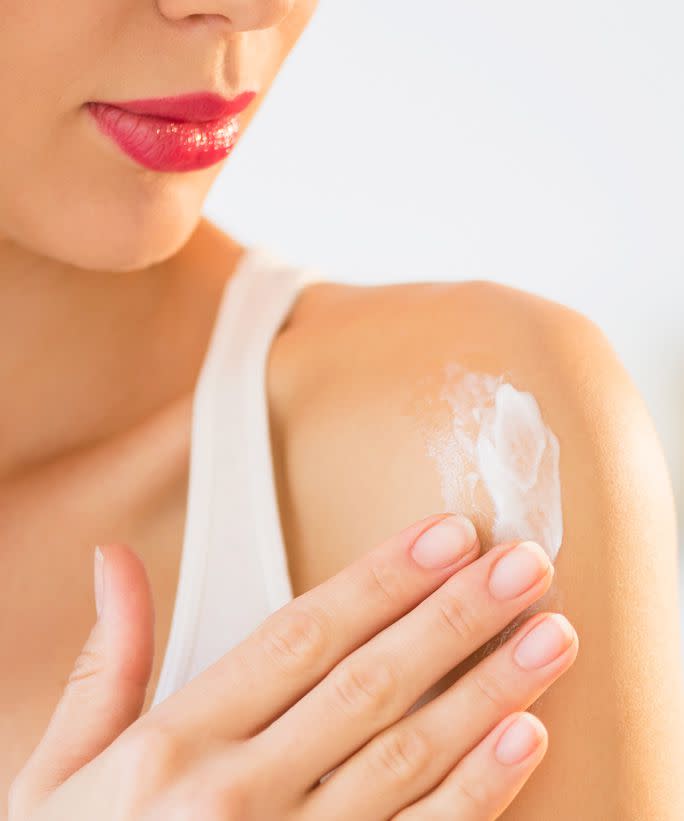What to Look for In a Sunscreen, According to a Top Dermatologist

Shopping for sunscreen can be complicated. Unlike other skin care products that tend to win you over with hydrating, firming, and smoothing claims, sunscreen bottles are plastered with seemingly clinical terms like "broad spectrum" and "UV protection." And while fixating on the sunscreen labels might give you flashbacks to your days paging through a college chemistry book, decoding the jargon on the packaging of your next SPF can be what saves you from a sunburn, breakout, and premature signs of aging. To help us out, we tapped dermatologist Marie Jhin, M.D., for her best sunscreen shopping tips.
Related:We Tested 52 Sunscreens, These 12 Are the Absolute Best
Keep reading for a skincare expert's advice on what to look for in a sunscreen.
UVA/UVB Protection
By now, you know that the sun emits harsh rays. But what exactly do the acronyms stand for? Ultraviolet A (UVA) and Ultraviolet B (UVB) radiation. "UVA rays go deep into the skin and cause aging," says Dr. Jhin. "UVB are the most common rays that cause sunburn." Both, however, can cause skin cancer, she warns. So when choosing a sunscreen, make sure that it defends against both UVA and UVB rays, this way, you're protected against all types of sun damage. We recommend something like Dr. Andrew Well For Origins Mega-Defense Advanced Daily UV Defender SPF 45 ($46).
Related:You're Sunburned and Your Skin Is Peeling — Here's What to Do
Broad Spectrum
It might not always be clear whether a sunscreen protects against UVA and UVB rays. If it doesn't explicitly say so anywhere on the label, reach for a sunscreen — such as EltaMD UV Facial Broad-Spectrum SPF 30+ ($32) — that says "broad spectrum" on the label. "Broad spectrum sunscreens protect you from UVA and UVB rays," says Dr. Jhin.
Ensuring that a sunscreen is broad spectrum will eliminate any doubt about whether you're fully protected. According to Dr. Jhin, sometimes a high SPF value can be misleading. For instance, we assume that the higher the number, the more we are protected, but this is actually a myth. "The sun protection factor (SPF) on a sunscreen tells you how long you can stay in the sun before getting a sunburn." The problem is, the SPF value only considers how much you're protected from UVB rays — not UVA rays — she explains.
Related:Sunscreen Facts and Myths You Need to Know About
Chemical vs Physical Formulas
Sunscreens are broken down into two categories: chemical and physical. Chemical sunscreens incorporate ingredients like oxybenzone and avobenzone into the formula to absorb rays. Meanwhile, physical sunscreens, which are often mineral-based, do exactly what they sound like — physically block sun rays from penetrating the skin. "Instead of getting absorbed and causing sun damage, rays bounce off this protective layer," says Dr. Jhin.
Related:Mineral vs Chemical Sunscreen: Which One Should You Use?
When deciding between a physical versus a chemical sunscreen, you'll want to think about your skin type and tone. Chemical sunblock is often preferred by those who are looking for a lighter, sheerer, and overall more wearable formula. Dr. Jhin likes La Roche-Posay Anthelios 30 Cooling Water-Lotion Sunscreen ($38). However, those with allergies and sensitive skin may find certain ingredients in chemical sunscreens irritating and opt for a mineral formula instead. Dr. Jhin's pick? Colorescience Sunforgettable Mineral Sunscreen Brush SPF 30 ($69).
Although mineral sunscreens are generally safe for most skin types, Dr. Jhin clarifies that they should not be mistaken for being natural. "The two minerals that are in physical sunscreens are titanium dioxide and zinc oxide — which are not natural ingredients. These are chemicals that create a physical barrier [to reflect UV rays].
Additionally, if you've got oily skin, you may be prone to comedones. "Comedones are blackheads and whiteheads," says Dr. Jhin. She recommends going with a non-comedogenic, or non-acne-forming, formula such as Neutrogena Clear Face Liquid Lotion Sunscreen Broad Spectrum SPF 55 ($11).
Related:The Best Sunscreens for Every Skin Type and Concern
The Bottom Line
Now that you're equipped with a comprehensive sunscreen glossary, Dr. Jhin leaves you with one last piece of advice. "It's most important to apply your sunscreen of choice every day." Let us reiterate—Every. Single. Day. No exceptions. That includes cloudy days and even days when you plan to stay indoors from AM to PM. UV rays can penetrate your car and home windows. So, apply, reapply, and reapply often.
Related:Just Wondering: Should I Wear Sunscreen Indoors?
For more InStyle news, make sure to sign up for our newsletter!
Read the original article on InStyle.

